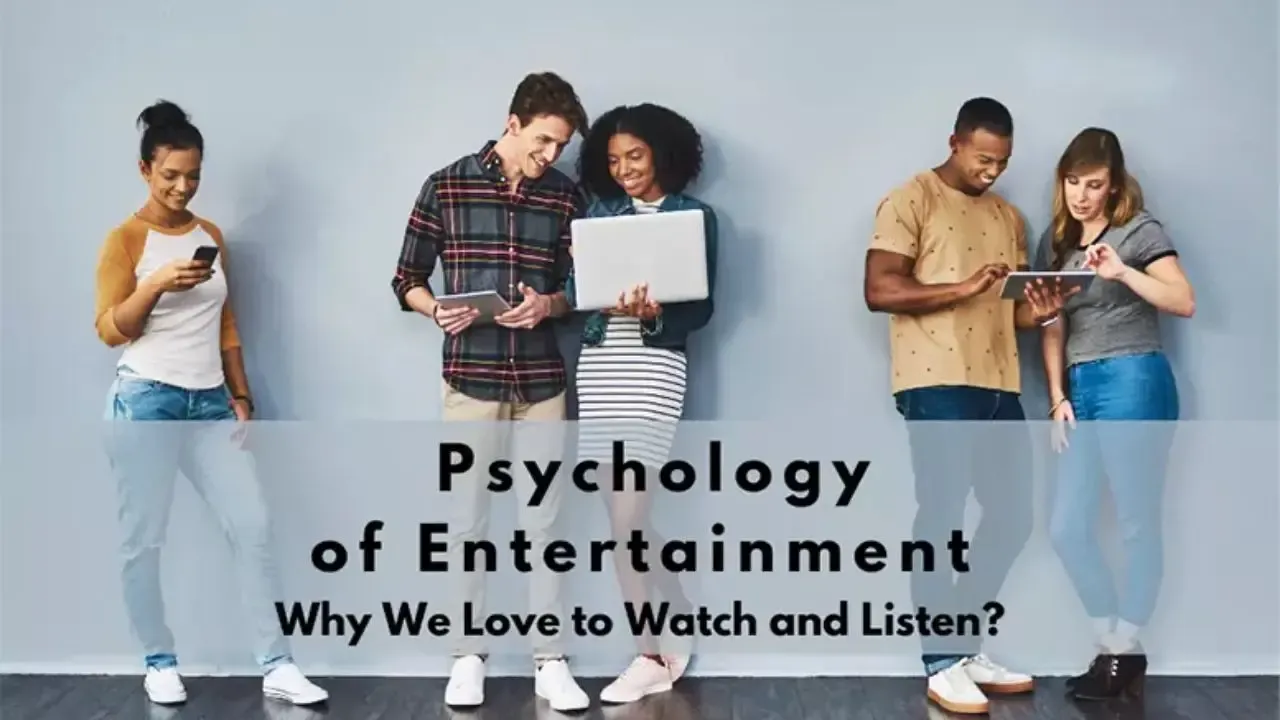Entertainment is an essential part of our daily lives. From movies, music, and TV shows to sports, video games, and social media, we engage with various forms of entertainment to relax, escape, and experience joy. But have you ever wondered why we are so drawn to entertainment? What compels us to spend hours watching, listening, or interacting with content that may not have any direct practical value?
In this article, we will explore the psychology of entertainment, uncovering the emotional, cognitive, and behavioral factors that make entertainment so captivating. We’ll examine the human needs that drive our love for entertainment, the emotional connection it fosters, and the science behind enjoyment.

Why Are Humans Drawn to Entertainment?
Maslow’s Hierarchy of Needs and Entertainment
Psychologist Abraham Maslow’s Hierarchy of Needs suggests that human motivation is driven by a pyramid of needs, ranging from basic survival to self-actualization. Entertainment plays a significant role in fulfilling several of these needs:
- Belongingness and Connection – Movies, TV shows, and social media create a sense of connection with characters, celebrities, and online communities.
- Self-Expression and Creativity – Music, art, and literature allow us to express emotions and explore our identity.
- Achievement and Mastery – Video games and competitive sports fulfill our need for challenge, competition, and accomplishment.
Examples of How Entertainment Satisfies Different Needs:
- Comedy movies provide humor and light-heartedness, fulfilling our need for joy.
- Horror movies offer excitement and thrill, engaging our curiosity about fear.
- Romance novels satisfy our need for emotional connection and love.
- Sports events create a sense of competition, community, and achievement.
The Emotional Appeal of Entertainment
How Entertainment Evokes Different Emotions
Entertainment is powerful because it triggers a wide range of emotions. Whether it’s the joy of a feel-good movie, the suspense of a thriller, or the nostalgia of a song, emotions deepen our engagement.
Entertainment creators use different techniques to enhance emotional appeal:
- Music and soundtracks – Sad music in movies intensifies emotional scenes.
- Cinematography and visuals – Dark colors in horror films create a sense of fear.
- Storytelling and character development – Well-written characters make us feel emotionally invested.
Psychological Benefits of Emotional Entertainment
- Stress Relief: Laughter from a comedy show reduces stress and improves mood.
- Emotional Processing: Sad movies allow us to process and cope with real-life emotions.
- Empathy and Understanding: Experiencing different emotions through entertainment fosters emotional intelligence and compassion.
The Science of Enjoyment in Entertainment
The “Hedonic Treadmill” and Entertainment Consumption
The hedonic treadmill is a psychological phenomenon where humans adapt to pleasurable experiences over time, reducing their initial excitement. For example:
- Watching the same TV show repeatedly becomes less enjoyable as familiarity grows.
- Listening to a favorite song too often may lead to diminished emotional impact.
Novelty and Surprise: The Keys to Engagement
Our brains crave new experiences and unexpected twists, which is why entertainment thrives on:
- Plot twists and suspense in movies and books.
- New music genres and remixes that keep songs fresh.
- Innovative video games with constantly evolving challenges.
How Personal Preferences Shape Our Enjoyment
Each person’s entertainment preferences are shaped by:
- Cultural background – Music, movies, and traditions vary by region.
- Personal experiences – Childhood favorites often remain nostalgic.
- Social influences – Friends, influencers, and media shape our entertainment choices.
The Behavioral Aspect of Entertainment
How Our Behavior is Influenced by Entertainment
Entertainment can have a significant influence on our behavior. It shapes our attitudes, beliefs, values, and social norms. For example:
- Watching a TV show that promotes healthy lifestyle choices may encourage individuals to adopt healthier habits.
- Exposure to entertainment that portrays negative behaviors, such as violence or substance abuse, may increase the likelihood of engaging in such behaviors.
The Social and Cultural Impact of Entertainment
Entertainment reflects and reinforces societal values, norms, and beliefs, making it a powerful tool for social change. It can:
- Challenge stereotypes – Positive portrayals of diverse groups can reshape societal attitudes.
- Promote awareness – Films and documentaries shed light on important social issues.
- Inspire movements – Music and art have historically fueled activism and cultural shifts.
For instance, movies and TV shows that portray strong female leads help challenge gender stereotypes and promote gender equality.
The Potential Negative Effects of Overconsumption of Entertainment
While entertainment provides numerous benefits, excessive consumption can lead to:
- Addiction – Over-reliance on entertainment can lead to escapism and dependency.
- Isolation – Too much screen time can reduce face-to-face social interactions.
- Physical inactivity – Prolonged sedentary activities may contribute to health issues.
Moreover, consuming excessive amounts of violent or explicit content can impact mental health and well-being, influencing thought patterns and behaviors.
Conclusion: Why Entertainment Captivates Us
Entertainment is more than just a pastime—it’s a fundamental part of human psychology. It fulfills our basic needs, evokes deep emotions, and brings excitement through novelty and personal connections. Whether through movies, music, sports, or games, entertainment shapes our thoughts, emotions, and interactions with the world.
What’s your favorite form of entertainment, and why does it make you feel good? Let us know in the comments!
Disclaimer:
This blog is for informational purposes only and not a substitute for professional advice. The views expressed are those of the author and do not reflect any official policies. The author makes no warranties about the accuracy or reliability of the information provided. Reliance on this information is at your own risk.







